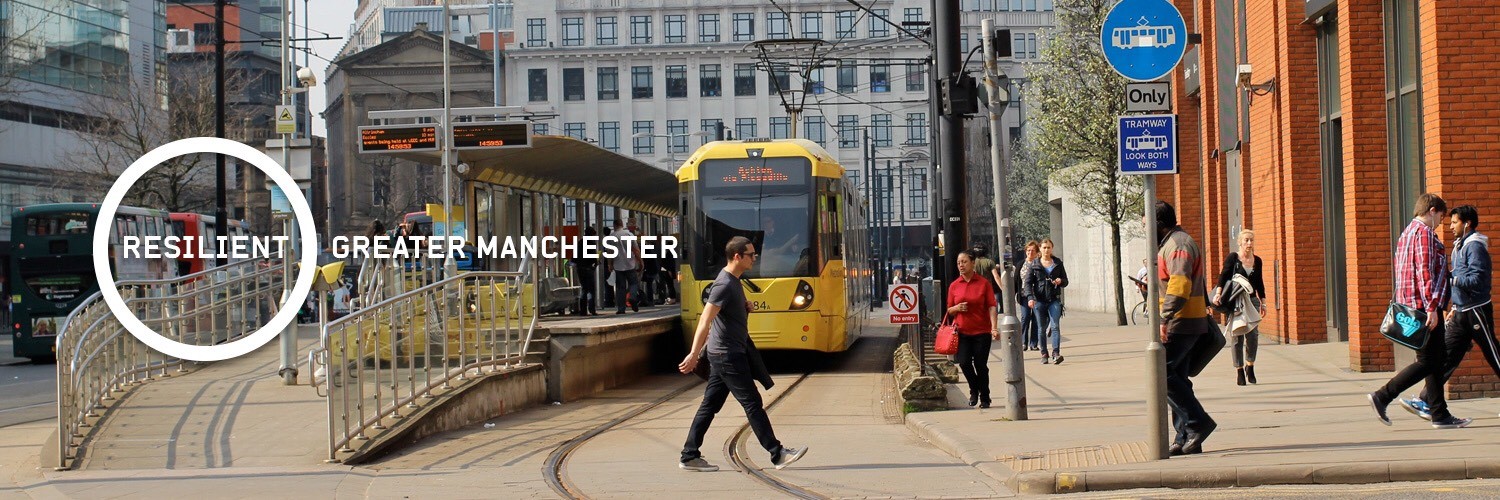
Resilience
What is Resilience?
“Resilience is about surviving and thriving, regardless of the challenge. Urban resilience is the capacity of individuals, communities, institutions, businesses, and systems within a city to survive, adapt, and grow no matter what kinds of chronic stresses and acute shocks they experience”.
Greater Manchester is home to nearly 3 million people and over 100,000 businesses. As the city region grows in size and complexity, as new technology becomes increasingly part of everyone’s lives and as international connections expand, Greater Manchester is focusing on how to build a resilient future.
Urban resilience can therefore be understood as the capacity of the city region to deal with shocks or disruptive events such as floods or flu pandemics that threaten our ability to keep on the path we have set for the future. This capacity to navigate shocks and to maintain confidence in the city region is also dependent upon recognising and addressing chronic stresses such as poverty or ageing infrastructure that weaken its fabric and can undermine attempts to respond to crises and to create a stronger future in their aftermath.
Greater Manchester Resilience Unit

The Greater Manchester Resilience Unit (GMRU) is part of the Greater Manchester Combined Authority (GMCA) and is led by the Chief Resilience Officer for Greater Manchester. The Chief Resilience Officer also has responsibility for the Local Authority Civil Contingencies and Resilience Unit (CCRU), a specialist unit providing expert civil contingencies services to the 10 Greater Manchester local authorities including in the areas of health protection, disaster risk reduction, emergency management and recovery. The unit offers a year-round emergency response service, ensuring Greater Manchester’s local authorities always have access to disaster management expertise.
The GMRU holds the secretarial responsibility for the Greater Manchester Resilience Forum (GMRF). The GMRF is a partnership of agencies including the emergency services from across the Greater Manchester Sub-Region with responsibility for coordinating and overseeing emergency planning. Its overall purpose is to co-ordinate an appropriate level of preparedness to enable an effective multi-agency response to emergency incidents which may have significant impact on the communities of Greater Manchester.
For more information on the activity of the GMRF and on how to prepare for emergencies please visit the Greater Manchester Prepared website:
Greater Manchester Prepared (link opens in a new window)
Greater Manchester Resilience Strategy
Greater Manchester Resilience Strategy 2020-2030 (PDF, 18.9MB)
Greater Manchester Resilience Strategy 2020-2030 - Plain text / Accessible Version (PDF, 433KB)
International Cooperation
Greater Manchester is proud to be part of two worldwide movements that are fostering new approaches to resilience and in so doing helping to protect communities and keep them safe.
United Nation’s Making Cities Resilient 2030
In 2014 Greater Manchester’s ten districts became role models in the United Nation’s Making Cities Resilient Campaign. Earlier this year Greater Manchester joined its successor, the Making Cities Resilient 2030 (MCR2030) programme. The ambition of these initiatives and of Greater Manchester are to deliver the international commitment of the United Nation’s Sendai Framework for Disaster Risk Reduction 2015 – 2030. The Sendai Framework aims to drive a substantial reduction of disaster risk and associated losses, whether these are losses in lives, livelihoods and health, or losses of economic, physical, social, cultural and environmental assets of persons, businesses, communities and countries.
As part of this, stakeholders can make voluntary commitments to support the implementation of the framework.
Greater Manchester has made a commitment to ‘Improving Disaster Resilience in an Ageing Greater Manchester’. This commitment aims to ensure that older people are heard when designing disaster resilience building programmes, enabling Greater Manchester to co-identify potential solutions and approaches to resilience. The participatory research conducted by Ambition for Ageing and the GM Resilience Unit is leading to innovative projects about disaster risk involving older people, for example an intergenerational programme of older people leading school workshops on planning for emergencies.
Report: Resilience in an Ageing Greater Manchester (link opens in a new window)
Resilient Cities Network
In 2016, Greater Manchester was selected to join the 100 Resilient Cities (100RC) programme, an initiative pioneered by the Rockefeller Foundation of New York. This initiative was dedicated to helping cities around the world become more resilient to the physical, social and economic challenges that are a growing part of the 21st century. It supported the adoption and incorporation of a view of resilience that includes not just the shocks – flooding, fires, terror attacks, etc. – but also the stresses that weaken the fabric of a city on a day to day or cyclical basis. By addressing both the shocks and the stresses, a city becomes more able to respond to adverse events and is therefore better positioned to deliver basic functions to the wider population at all times.
The 100RC programme has since evolved into the Resilient Cities Network – a city-led global network of cities that are committed to building and investing in urban resilience. Greater Manchester remains an active member of this network which brings together global knowledge, practice, partnerships, and funding to empower members to build safe and equitable cities for all.
Join: Expression of Interest Partner | Making Cities Resilient 2030 (undrr.org)
United Nation’s Sendai Framework for Disaster Risk Reduction 2015 – 2030
Network - Resilient Cities Network
Recent projects
Uscore2 – International Peer Review of Disaster Risk Reduction
Uscore2 is a peer review process designed for cities by cities. Using funding from the European Commission, Uscore2 enables cities across the world to share their experiences and learn from each other about good practice in Disaster Risk Reduction (DRR).
In 2017 and 2018 Salford and Greater Manchester have been part of the Uscore2 project, designing and piloting the city-to-city peer review tool for DRR. A link to a summary of the outcomes of the Salford peer review can be found below.
UScore2 (link opens in a new window)
Contact
Email: contingencies.agma@manchester.gov.uk
Follow us on Twitter
Latest Topic News
Resilience